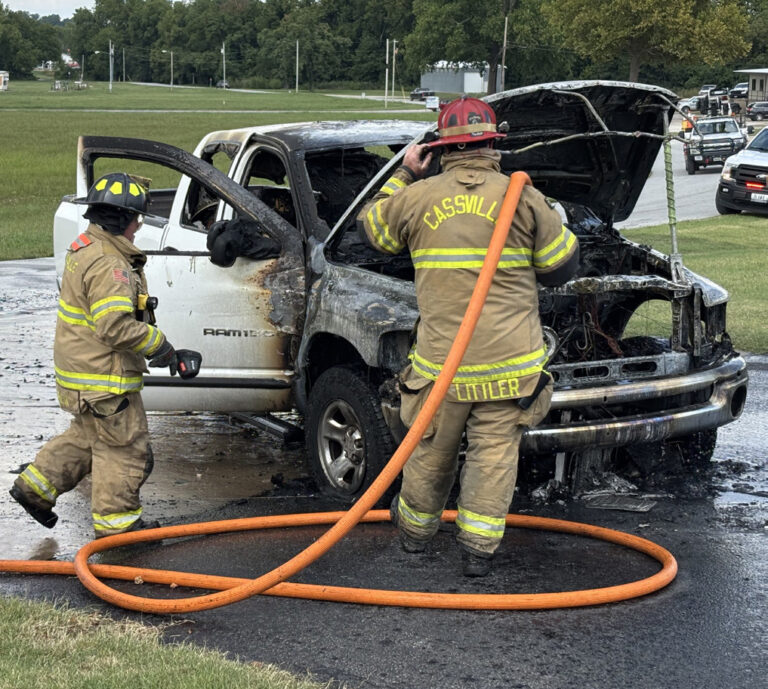Good question, no answer
“Why is the Missouri Department of Natural Resources (DNR) allowing Denali Water Solutions to operate illegally in Missouri?”
The question was posed repeatedly by the overflow crowd at Fairview Friday night after a presentation by environmental attorney Stephen Jeffery, who serves as legal counsel for SLUDGE (Stop Land Use Damaging our Ground and Environment).
The SLUDGE-hosted chili supper and informational event in the John Q. Hammons Community Center, where Jeffery spoke, was for the purpose of educating the public about the citizen group’s lawsuit filed against the DNR in Cole County Circuit Court on Oct. 29. The DNR, the group alleges, is allowing Denali Water Solutions — a global waste recycling business — to operate illegally in Missouri by not forcing them to obtain the solid waste permits they say that Missouri law requires.
Friday night’s standing-room-only event drew some 200 residents from Newton and McDonald Counties, including Missouri State Sen. Jill Carter, R-Granby, and State Sen. Mike Moon, R-Ash Grove, and State Rep. Dirk Deaton, R-Noel. Newton County Commissioner Daniel Swem was also in attendance.
After a warm welcome and a brief presentation by SLUDGE members Vallerie Steele, Taryn Tyler, Korrie Bateman and Adam Perriman, characterizing the types of ingredients in the Denali storage basins located near Fairview and Longview, Jeffery took the lectern, where he enumerated and defined the reasons behind SLUDGE’s allegation that the DNR is failing to uphold Missouri’s Solid Waste Law.
“Solid waste, according to the DNR’s definition, is ‘garbage, refuse and other discarded materials, including solid and semi-solid waste from industrial, commercial, agricultural, governmental and domestic activities,’” Jeffery said. “The ingredients Denali told the DNR that it’s dumping into its two southwest Missouri storage basins include ‘organic solids, semi-solid residues, flocculated solids, animal fats, vegetable oils and grease collected from food and animal processing.”
The ingredients on Denali’s list, Jeffery said, are remarkably similar to the DNR’s own definition of solid waste, and, as such, should require Solid Waste permits from its handlers.
“In Arkansas, Denali possesses 250 operating permits under the Standard Industrial Classification (SIC) of ‘Refuse Systems,’ he said.
Jeffery said on its own website, Denali labels itself as a “Waste Disposal and Recycling Business.”
In Missouri, though, Jeffery said Denali classifies itself as a “Soil Preparation” industry, a distinction which may have played a part in allowing the company to operate in Missouri for multiple years with only fertilizer permits issued by the Missouri Fertilizer Control Board (MoFCB). Those fertilizer permits exempted Denali from DNR oversight, although it was still subject to the regulations of the Missouri Clean Water Law.
The days of fertilizer exemptions for Denali, Synagro and several other industries operating in Missouri ended on June 30 of this year, when the MoFCB opted not to renew their fertilizer permits, stating that a fertilizer permit was unnecessary for companies who didn’t charge farmers for the land application of their waste. Denali and Synagro, another company land-applying waste in southwest Missouri, immediately filed suit against the MoFCB also in Cole County Circuit Court, alleging that the Board violated the Missouri Fertilizer Law. They are asking a judge to rule in their favor and reinstate their fertilizer permits.
Without the fertilizer permits, Jeffery said Denali and Synagro are currently operating in a legal vacuum under what the DNR calls its “enforcement discretion.” Such discretion is purely arbitrary and violates the law, alleges Jeffery.
Denali, Jeffery said, has submitted operating applications to the DNR for five sites in Missouri; three of those applications — including for its southwest Missouri storage basins — are for a water permit under the Missouri Clean Water Law, where there would be no accountability to the DNR unless violations of that law were to occur.
“Why would a solid waste company want to avoid obtaining a solid waste permit, and, instead, obtain a water permit?” he asked.
The answer involves time and money, Jeffery said, and lots of both.
Jeffery explained that under the Missouri Solid Waste Law applicants are required to meet several requirements. They must conduct a preliminary site investigation – which includes examinations of soil types and the geological features of what lies below the surface of the land (springs, fault lines, etc.); they must submit a detailed site investigation work plan and a geologic and hydrologic site characterization report; they must obtain construction permits (for basins or other facilities); and they must obtain an operating permit.
“The whole process could take up to five years,” Jeffery said.
The extensive requirements and costs associated with the acquisition of solid waste permits could prove to be a deterrent to Denali and other companies, he said.
The purpose of SLUDGE’s lawsuit against the DNR is to force the state agency to uphold the law by requiring that Denali obtain solid waste permits and to cease its operations until it does.
Jeffery believes the DNR’s reaction to a similar suit filed in Cole County on behalf of Citizens of Randolph County (CRAP) is interesting.
“Instead of [the DNR] stopping and saying, ‘Hey, maybe the citizens of Missouri have a valid argument, and maybe we should rethink this,’ they asked the judge to throw the case out,” Jeffery said.
Randolph County is located in northeast Missouri, where Denali constructed a 15-million-gallon storage basin which has not yet been filled.
Carter finds the Randolph County suit interesting as well.
“Randolph County’s situation broadens the perspective to a state issue, not just a local one here in our area,” she said.
Deaton said he understands fighting battles on a local level.
“This issue isn’t about a particular company, though,” he said. “It goes beyond that. Several years ago, before the company mentioned tonight came on the scene, there was another company committing similar violations in McDonald County. That issue didn’t get much attention, because the storage basins hadn’t been installed in the area yet. If the company talked about tonight wasn’t around, it would be somebody else.”
Deaton encouraged those in attendance to report every incident or suspected violation they see to the DNR and their legislators.
“These things accumulate and catch attention,” he said.
Deaton also encouraged residents to show up in Jefferson City for public hearings regarding legislation.
“When people show up, we notice,” he said.“I don’t want to do anything to harm legitimate agriculture, but there’s a right way and a wrong way to do business, and when a company is not acting in a neighborly way, something needs to change.”
Prior to the legislature’s January session, Deaton said he, along with other members of the House, hopes to introduce some prospective legislative changes regarding the way the DNR conducts business.
The question was asked again: “Why is the DNR allowing Denali to operate illegally?”
Nobody answered.
Deaton did, however, offer a brief Civics 101 refresher.
“The DNR is part of the Executive branch of Missouri’s government,” he said. “It’s Governor Mike Parson’s DNR.”
According to Ballotpedia, during Mike Parson’s Missouri senatorial tenure from 2011-2017, he supported the passage of Missouri’s controversial “Right to Farm,” a legislatively-referred constitutional amendment which passed by a slim margin in 2014. The amendment was sponsored by former State Rep. Bill Reinholdt, who was previously presiding commissioner of Newton County.
Supporters of the “Right to Farm” amendment argued that it would protect farmers from out-of-state business interests.
In practice, among other “rights,” the amendment has paved the way for a law protecting large commercial agricultural enterprises from “nuisance suits.”
While a state senator, Gov. Parson sat on the Agriculture, Food Production and Outdoor Resources Committee from 2011-2015. During that time, a law proposing the organization of the Missouri Fertilizer Control Board was introduced by fellow committee member from Clay County, Brian Munzlinger, which became effective Aug. 28, 2016.
By year ending June 2018, according to Cause IQ, the fertilizer board had received grants and contributions pushing $2 million and had a balance, after expenses, of more than $1 million.
With MoFCB-issued fertilizer permits in hand, businesses were exempted from DNR oversight.
Parson assumed the governorship of Missouri in May 2018, after Eric Greitens vacated the office. Parson was then elected at the ballot box in 2020.
Since 2018, four Denali storage basins have been constructed in Missouri without permits or oversight from the DNR: the organization charged with protecting Missouri’s outdoor resources.




